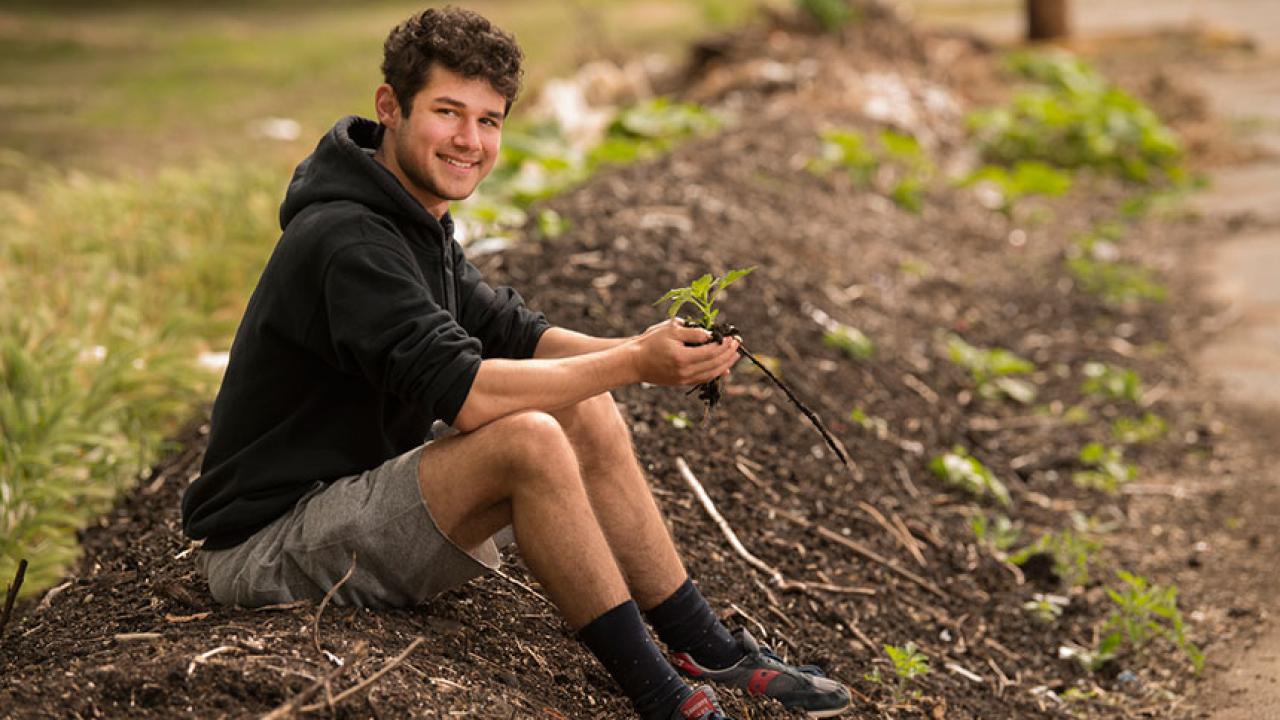Nearly 40 percent of UC Davis undergraduates participate in hands-on research. On the occasion of the 28th annual Undergraduate Research, Scholarship and Creative Activities Conference on April 28 and 29 — where more than 700 students will present their work — we introduce you to some students and alumni who share what they’ve gained. Consider how the experience can benefit you, too.
1. Exploring career directions
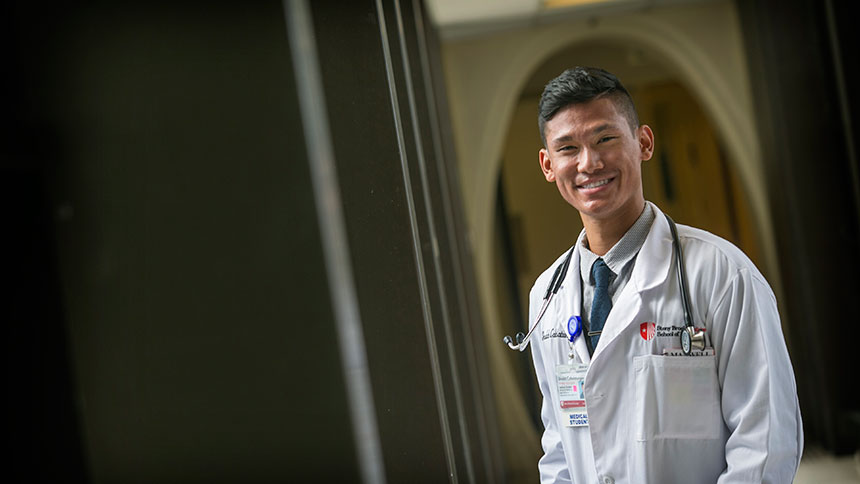
Here is how undergraduate research influenced the direction of three UC Davis students:
Check out the conference
Come to our annual Undergraduate Research, Scholarship and Creative Activities Conference
- Friday, April 28 — Poster sessions and arts exhibit, 3-7 p.m., The Pavilion
- Saturday, April 29 — Oral presentations, 1-4:30 p.m., Wellman Hall
Free and open to the public
The conference website includes the agenda and more.
Shadd Cabalatungan started his studies at UC Davis aiming for a career as a veterinarian. Touched by his aunt’s diagnosis with breast cancer, he got involved with research at the UC Davis Comprehensive Cancer Center. That experience was key in changing his direction to pursue a medical degree. He also did research on how drinking by college students affects others who don’t drink. With a degree in sociology, he is now completing his first year as a medical student at Stony Brook University.
Graduating senior Rong Ben, once fascinated by the aesthetics of fashion, is geeking out on how technology can be incorporated so fashion helps solve problems. As a junior, she did a research internship with a professor working on wearable technology, including gloves to provide a patient’s vital statistics. “It opened up a new view for me,” said Ben. As a participant in the University Honors Program, Ben designed a grab-and-go coat for safety in an earthquake with protective materials, lighting, emergency food and water, and more. Next up for Ben: the graduate program in fashion enterprise and society at the University of Leeds. At the conference: arts exhibit at 3 p.m. Friday in the Pavilion
Physics major Mario D’Andrea took a course related to climate neutrality to confirm his desire to study physics in graduate school. He worked with two other students to research waste reduction and carbon sequestration through composting. He enjoyed the research, and it helped confirm his desire to study condensed matter physics in graduate school. “I wish more classes were open-ended like this,” he said. At the conference: poster session at 5 p.m. Friday in the Pavilion
2. Building transferable skills and enhancing resumes
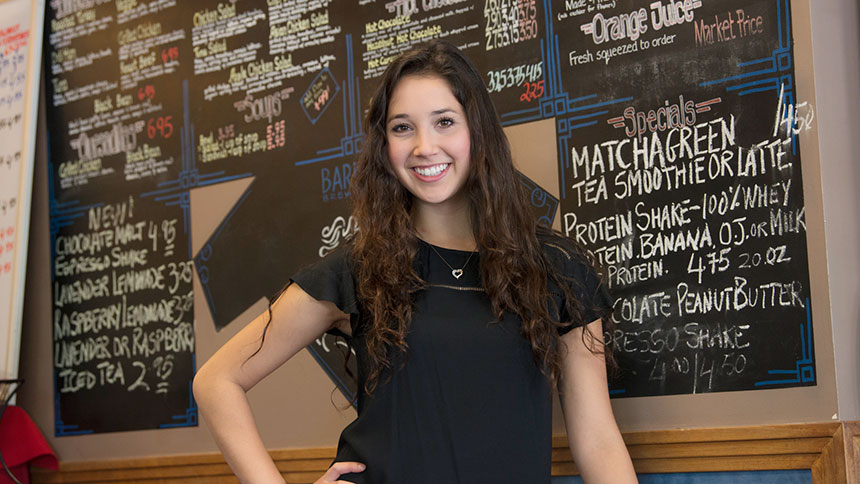
Graduating senior Julie Beppler has learned a lot about food options in downtown Davis. The managerial economics major analyzed how 49 restaurants use menu design to promote certain items. But more than that, she developed and demonstrated skills that employers seek. Beppler first worked as a research assistant and then pursued this project for her Undergraduate Honors Thesis. It focuses on the cost of production and price of featured menu items as well as their relative healthiness. She taught herself computer programing; learned time management; practiced professional communications as she interacted with restaurant managers; and proved her ability to motivate herself and direct her own work.
Beppler will soon start in the management development program at E. & J. Gallo Winery, so take her word that doing research can also help students find a mentor who can provide letters of recommendation and advice to support their success. Kristin Kiesel, a faculty member in agricultural and resource economics and a mentor to Beppler, agreed: “There is no better way to recommend a student than by having them successfully complete an undergraduate research project.” At the conference: oral presentation at 3:15 p.m. on Saturday in Room 207 of Wellman Hall
3. Learning to publicly advocate for and defend work
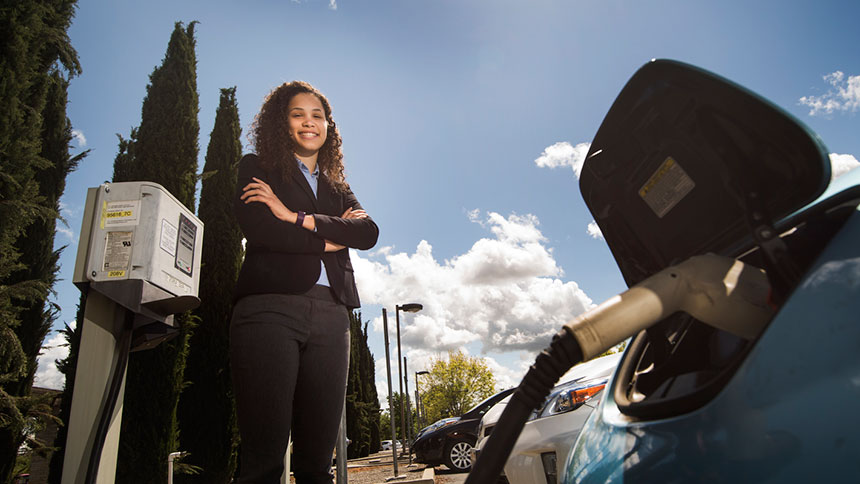
“Nerve wracking.” That’s how graduating senior Kathryn Green described her anticipation of presenting for the first time her research on California’s clean car consumer rebate program. Now she’s a UC undergraduate research ambassador. Last quarter, the political science major participated in the policy program at the UC Center Sacramento, which included classes, an internship with the advocacy organization Environment California and a research project.
Presenting the research was a requirement. Green designed a large poster representing her research and, in a session lasting 90 minutes, explained it one-on-one to attendees. She talked about the process and her policy recommendations not only to policymakers and people from the clean car industry, but also to others who were unfamiliar with the topic. “I became almost a teacher,” said Green. “I took my research and explained it to someone who didn’t know about it.”
Based on her success in that venue, Green represented UC Davis at showcase in Los Angeles last week for alumni, donors, regents and other friends of the University of California. “I’m really proud I got to go down and share my research,” she said.
4. Getting a leg up on graduate or professional school
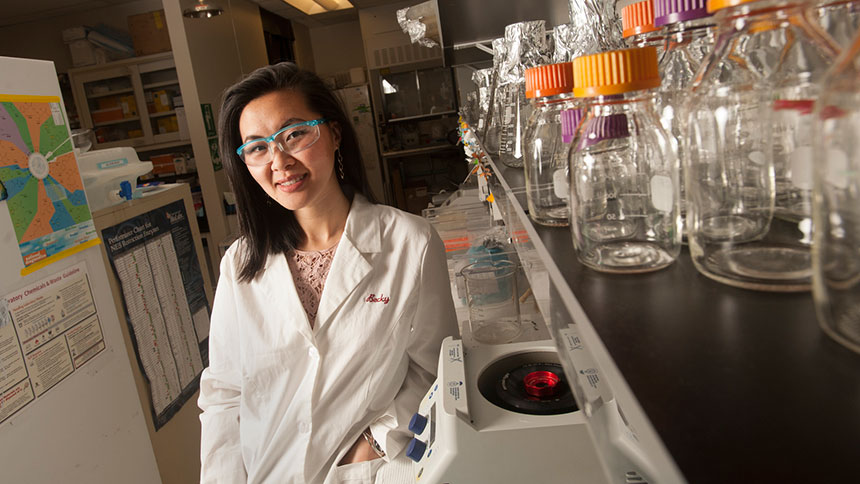
When Becky Fu came to UC Davis in 2008, she was the first in her family to attend college. Nine years later, she is preparing to defend her dissertation and graduate from Stanford University with a doctoral degree in genetics and a master’s degree in biomedical informatics. A 2012 graduate from UC Davis, she credits her participation in undergraduate research as foundational to where she is today. “No question about it,” she said. “Without undergraduate research, there would have been no way I got into any of the graduate programs I did.”
As a freshman, Fu heard others talking about research and sought out the Undergraduate Research Center on campus for more information. She went on to do research with two professors; participate in the undergraduate research conference; publish in Explorations, the UC Davis journal of undergraduate research; be awarded a Provost’s Undergraduate Fellowship to help pay for her research; and win the Chancellor’s Award for Excellence in Undergraduate Research and other awards.
“Having that experience as an undergraduate to fail a lot and expand on the techniques,” Fu said, “was an integral part of being prepared for and getting through the doctoral program.” At Stanford, she is working in the lab of Andrew Fire, who shared the 2006 Nobel Prize for Physiology or Medicine.
5. Contributing knowledge and impacting the world
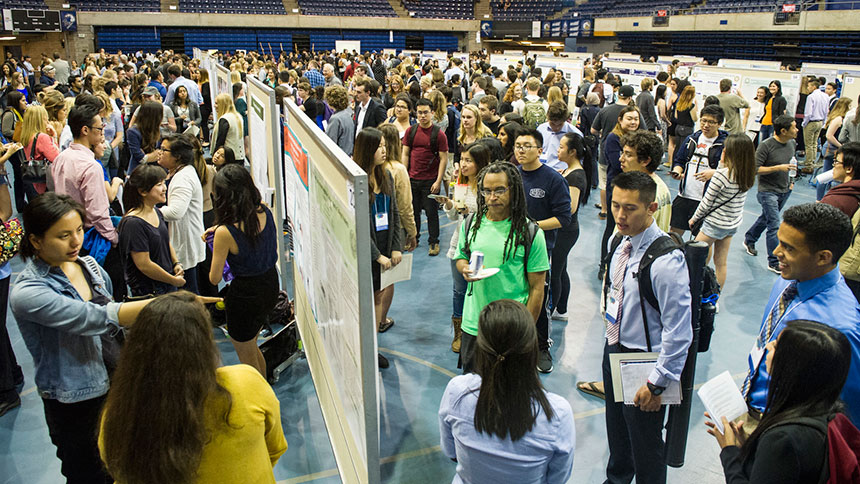
Annaliese Franz, associate professor of chemistry and faculty director of the Undergraduate Research Center, sees students experience the joy of discovery and creation through research. “Students really get the chance to create something new as they go into the lab or out into the field or study new policy.”
Fu, the Stanford student, explained how undergraduate research developed a new quest for her: “I wanted to be contributing to a bigger cause, a bigger realm of intelligence, and that’s advancing medical care in general.”
And Green, who did the research on the clean-car rebate program, discovered a new power. “My research told me that an undergraduate can make an impact,” she said. “You don’t have to have a master’s degree or doctorate to make valuable contributions.”
Media Resources
Julia Ann Easley, UC Davis News and Media Relations, 530-752-8248, jaeasley@ucdavis.edu
